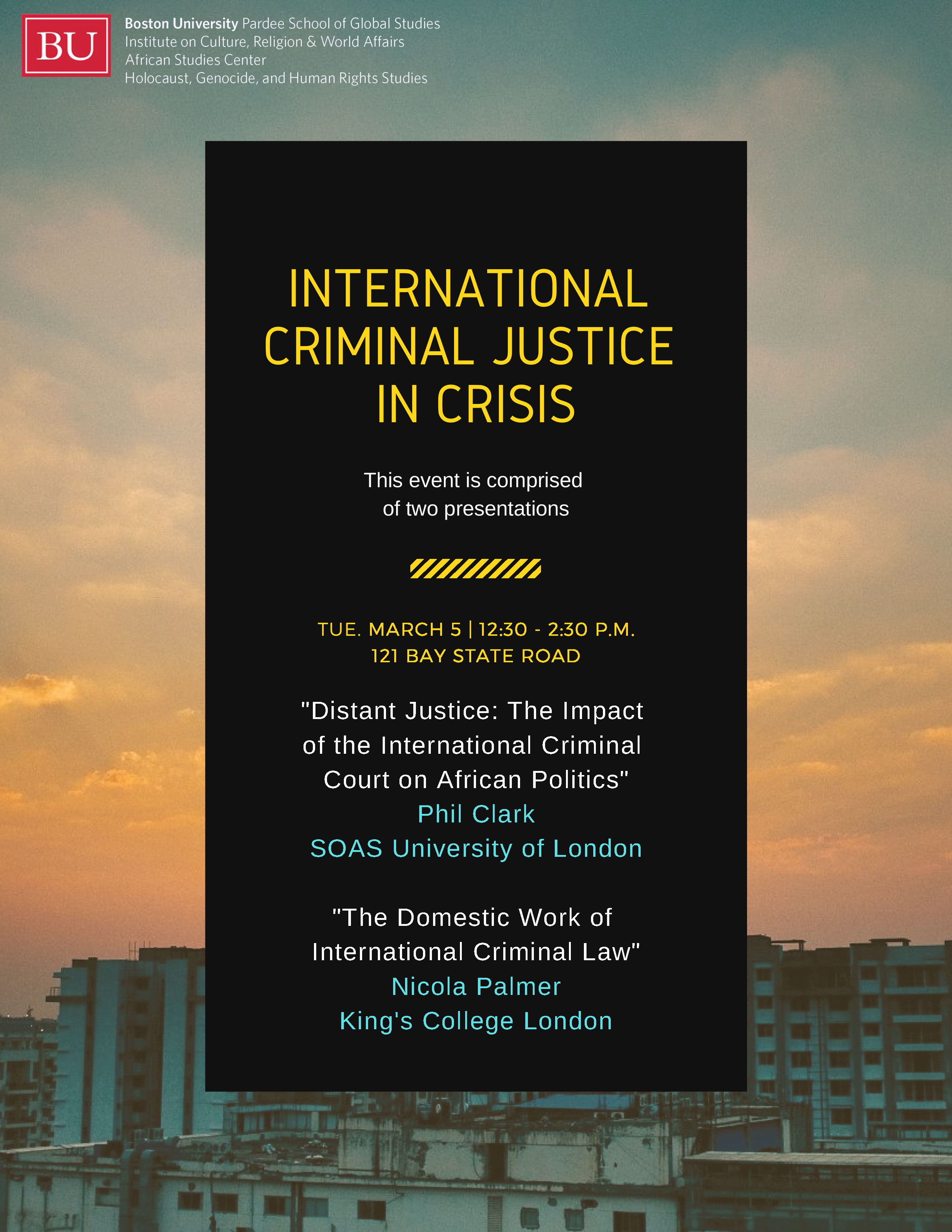International Criminal Justice in Crisis
Distant Justice: The Impact of the International Criminal Court on African Politics
Phil Clark
The International Criminal Court (ICC) is struggling at every level of its operations in Africa – in terms of its investigations, prosecutions, and relations with domestic governments, judiciaries and affected communities. This raises key questions about whether, after 16 years of consistent shortcomings and mounting frustration even among some of its most ardent supporters, the Court can survive. A central cause of the ICC’s travails is its remoteness from the societies in which it operates. The Court’s conceptual and practical ‘distance’ from the places where crimes are committed greatly undermines its effectiveness and requires a major rethink about how international criminal justice is conducted, especially in the Global South. This presentation lays out the main arguments of my new book, Distant Justice: The Impact of the International Criminal Court on African Politics (Cambridge University Press), and draws on 20 months of fieldwork in central Africa and The Hague since 2006, including 650 interviews with ICC officials, domestic political, legal and civil society actors, and local communities.
Dr. Phil Clark is a Reader in Comparative and International Politics and Co-Director of the Centre on Conflict, Rights and Justice at SOAS University of London. His work focuses on mass conflict and its aftermath, including issues of transitional justice, reconciliation, peacebuilding and the politics of international criminal law. His latest book is Distant Justice: The Impact of the International Criminal Court on African Politics (Cambridge University Press) and he previously published the monograph, The Gacaca Courts, Post-Genocide Justice and Reconciliation in Rwanda: Justice without Lawyers (CUP). Previously, he was co-founder and convenor of Oxford Transitional Justice Research. He holds a DPhil in Politics from the University of Oxford, where he studied as a Rhodes Scholar.
The Domestic Work of International Criminal Law
Nicola Palmer
As international criminal courts have faced increasing critique, major funding constraints and a crisis of legitimacy, there has remained an argument in favour of domestic proceedings for international crimes. Yet the work of international criminal law in a domestic setting may be very different from an international one. This presentation will examine the domestic immigration, extradition and trial proceedings against Rwandans suspected of involvement in the 1994 genocide. First, it will place these cases in the context of the work of UN International Criminal Tribunal for Rwanda, the Rwandan national courts and the localised gacaca courts, highlighting the importance of understanding how the objectives of judicial institutions affect their legal decisions. Second, it will draw on an independently generated dataset of 120 cases concerning domestic legal proceedings against Rwandans occurring in 22 countries around the world. To date, these proceedings have resulted in 18 individuals being deported or extradited to Rwanda to face genocide charges, while 30 individuals have had their extradition to Rwanda denied, 34 have faced domestic criminal trials in their host state and 14 Rwandan nationals have had their refugee protection or residency permits revoked on the basis of their alleged involvement in an international crime. The presentation will argue that when looked at in terms of their expressive content, these cases communicate not only an on-going international commitment to recognising the wrong of genocide, but also more ambiguously what constitutes a fair trial in Rwanda, who constitutes a ‘criminal migrant’ and, to a Rwandan audience, the extent of the punitive reach of the Rwandan state into diaspora communities. The presentation will conclude by arguing that if the expressive function of international criminal law is to be taken seriously in domestic settings it is crucial to make explicit the plural audiences addressed by these legal proceedings.
Dr. Nicola Palmer is as a senior lecturer in criminal law at King’s College London and the author of ‘Courts in Conflict: Interpreting the Layers of Justice in Post-Genocide Rwanda’ (paperback OUP, 2019). She has written on questions of resistance to mass violence, methodological approaches to transitional justice and the intersections of plural legal processes.
Nicola was previously the Global Justice Research Fellow at St Anne’s College, Oxford and convenor of the Oxford Transitional Justice Research (OTJR) network. She received her DPhil in law from the University of Oxford in 2011. Prior to this, she worked at the United Nations International Criminal Tribunal for Rwanda, following her undergraduate in law and economics at Rhodes University, South Africa. Her broad research interests are in international criminal law, transitional justice, central African studies and legal anthropology. Email: nicola.palmer@kcl.ac.uk
